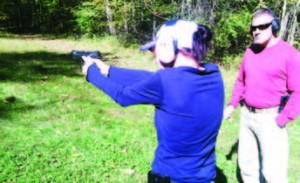by Chris Cerino

Chris Cerino, right, head of Cerino Training Group, instructs a newcomer in a
beginner class for concealed carry licensees. He’s a nationally known firearms
instructor and competitor who has been training law enforcement officers, military
personnel and civilians for more than 11 years. He has worked in peace keeping
positions at the federal, state, county and local levels for more than 20 years. You
can email him at: chris@cerinotraininggroup.com; phone: 330-608-6415.
How do you eat an elephant? One bite at a time! Undoubtedly, an apparently huge task with an almost seemingly too simple answer. This saying comes to mind more often than you might think as my life is filled with, what appear to be, elephant-sized tasks.
Most recently, it came to the forefront as we were teaching another training class of civilians who are new to shooting but want to become gunowners and carriers of concealed weapons (CCW) permit holders.
These men and women have an elephant-sized task or tasks ahead of them: first, choosing and purchasing a handgun, ammunition and holster. Finding training to provide the confidence and skills to keep a gun in their home or on their person, and then being able to handle and use it. All of which are likely to cost time, money and sweat equity. If poor choices are made, it can be a waste of all three.
As we trained these men and women it became apparent that they had very little knowledge of the many great choices for defensive firearms on the market today. They also had no idea how much they could cost. Both problems can be cured by reading any of the great gun magazines out today or by spending some time in a local gun store or gun range.
Apart from all pistols having sights and a trigger, they are very different.
The difference between semi-automatics and revolvers is huge. Choosing one or the other should be based on your own ability and desire to train with it. Double-action, singleaction, or double-and-single-action? Exposed hammer, no hammer or striker fired? We had many questions about lasers, their applications and costs. All of this and I haven’t even touched on the idea of holsters or ammunition. Remember that statement about eating an elephant? Not so silly now. Right? I tell everyone I teach not to fret over all these choices. It can be done if you make good decisions. Police, civilian and military students all get overwhelmed when they look at what it takes to become a skilled gun handler and shooter.
The most important way to shortcut your journey is to find a good trainer or knowledgeable friend, someone who has experience with a variety of guns and equipment and is minimally opinionated. Take heed of anyone who uses words like “always and never” excessively and be cautious of their recommendations.
Ask a lot questions and if you can’t get answers to your “why” questions, move on. Go to the gun shows or stores with no intention of buying a gun, only to look at them, so you can relax and learn. Look guns over to determine your preferences. Feel them, point them and dry fire them.
If you can’t dry fire them, move on. If you can go to a range and rent guns, do it. You will learn a lot when you shoot them—especially if you do it with someone who has some ability and experience. Whatever you do, don’t just buy something that looks cool. Feel and function, then looks.
That’s the order.
When it comes to your CCW permit training try your best to find an instructor with a good reputation. Be aware that there are many instructors out there who hold a certification to “certify” you, however, it does not mean that you are well trained. Training is best described as time on task. CCW certification training in most states is composed of a lion’s share of classroom training with a small block of live fire. The live fire portion is simply a minimum display of proficiency, and for most their first exposure to handgun shooting.
Eating the elephant of proficiency is undoubtedly the biggest task. Look for training classes near you. Possibly at local gun ranges or clubs.
Maybe you should join a club. While there, seek out some of the better shooters. Ask them for advice or even private tutoring.
Be cautious of gaining knowledge online as there are many wannabes out there who love to give incorrect or unproven advice. They don’t call it the “error net” for nothing.
Rome wasn’t built in a day. Don’t try to become a tactical guru in one session. Keep in mind that everything you do is training and what you do most often is what you have trained to do. So, get some solid, basic training that you can repeat and build upon. Practice on your own, if you have to, but it’s always best to train with a friend’s watchful eye. Don’t forget it’s the basics that win the day.
Until next time.
Those who can, do.
Those who understand, should teach.



